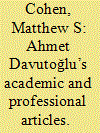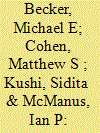|
|
|
Sort Order |
|
|
|
Items / Page
|
|
|
|
|
|
|
| Srl | Item |
| 1 |
ID:
149421


|
|
|
|
|
| Summary/Abstract |
International relations theories have sometimes been criticized as being focused on a narrow set of ideas and values. This article provides a means by which this problem can be addressed by examining the theories of former Turkish Prime Minister Ahmet Davutoğlu, who, prior to joining the government, was an international relations scholar. The article argues that gaining a greater understanding of Davutoğlu’s academic and professional publications is valuable not only to scholars interested in studying Turkey, but also to the study of international relations. Distinguishing him from other thinkers, Davutoğlu’s models are a combination of Islamic values, civilizational theories, and constructivism.
|
|
|
|
|
|
|
|
|
|
|
|
|
|
|
|
| 2 |
ID:
147379


|
|
|
|
|
| Summary/Abstract |
This article provides insights into the dangers and opportunities that the cyber realm poses to states by conducting the first comprehensive case study on Israeli use of cyberspace. Israel faces a constant barrage of cyberattacks from actors ranging from states to hacker groups to individuals. This has forced Israel to develop highly advanced capabilities. Israel has not just faced cyberattacks but has also been a leader in using the cyber realm for offense. Although the threats to Israel are severe, they are not unique; thus, Israel can serve as a model for what other states can do to effectively use cyberspace both defensively and offensively. This article offers policy recommendations as to how states can improve their cyber defenses.
|
|
|
|
|
|
|
|
|
|
|
|
|
|
|
|
| 3 |
ID:
143596


|
|
|
|
|
| Summary/Abstract |
Although many policy-makers and scholars maintain that international norms have altered the motivations underlying state behaviour, this article argues that states continue to pursue national self-interest, but in ways that remain understudied. While traditional realist assumptions explain a great deal of state behaviour, they have not been widely used to account for important alternative tools of state intervention, such as economic and normative strategies. Focusing on the case of Russia's 2014 intervention in Ukraine, this article offers insights into how, and under what circumstances, these tools are used to accomplish traditional state objectives. Guided by the tenets of neoclassical realism, the article argues that in the case of Russia, military force is no longer the sole, or even the primary, means used to accomplish traditional security goals. Such dynamics have significant theoretical and policy implications for contemporary international relations.
|
|
|
|
|
|
|
|
|
|
|
|
|
|
|
|
| 4 |
ID:
158144


|
|
|
|
|
| Summary/Abstract |
Efforts to isolate and delegitimise nations pose a growing danger to state security. The components used in such efforts are, however, not fully understood. This article expands upon existing research by proposing that there are seven areas in which states can face isolation efforts: political, economic, military, sociocultural, media, lawfare, and religious. Moreover, it proposes the idea of ‘destruction-oriented’ isolation, which aims to destroy a state, not merely create change. The ongoing campaign against Israel serves as the case study. Gaining a better understanding of these different tools will allow states to better prepare themselves to withstand these threats.
|
|
|
|
|
|
|
|
|
|
|
|
|
|
|
|
|
|
|
|
|